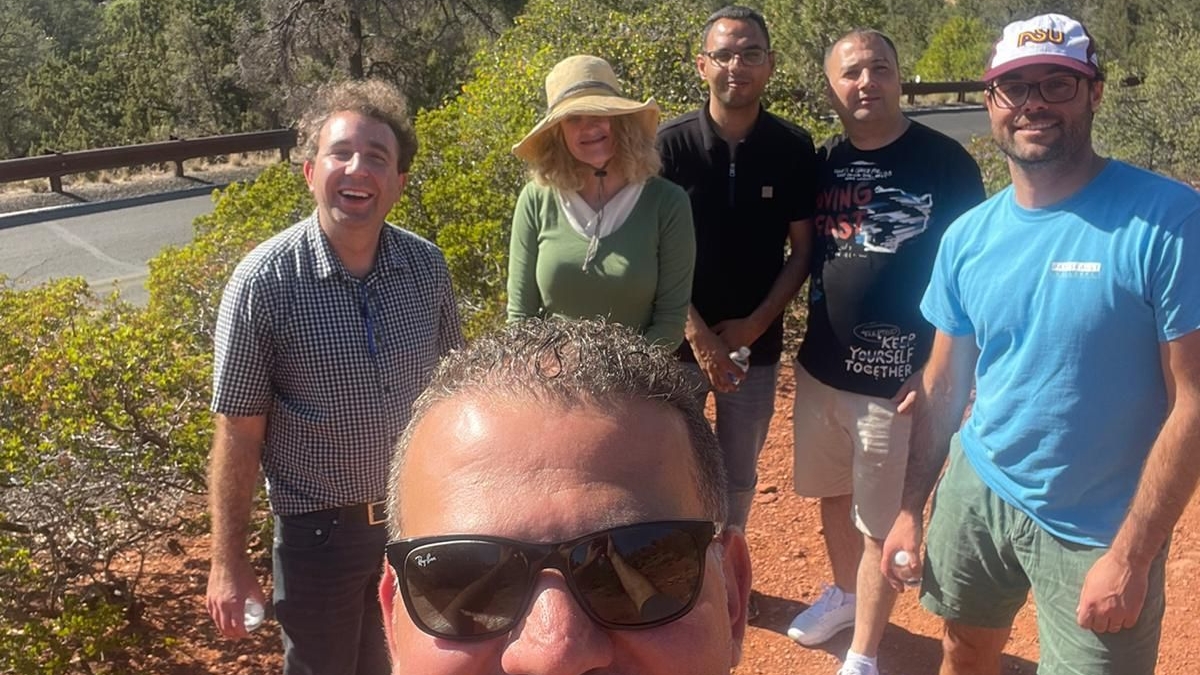ASU institute hosts Palestinian delegation visit from An-Najah National University

Jafar Ahabre (front, An-Najah National University) with (back row, from left to right) Jake Leveton (Institute for Humanities Research, ASU), Catherine O’Donnell (School of Historical, Philosophical and Religious Studies, ASU), Ahmad Qabaha (An-Najah National University), Asaad Taffal (An-Najah National University) and Matthew Casey-Pariseault (School of Historical, Philosophical and Religious Studies, ASU) in Sedona.
The Institute for Humanities Research at ASU hosted Palestinian faculty from An-Najah National University May 23–27.
The visit was facilitated by a $60,000 grant, “Entrepreneurship Education for the Humanities and Social Sciences," submitted by Jeffrey Cohen, dean of humanities at The College of Liberal Arts and Sciences. The grant is part of the Institute of International Education's Sustainable U.S.-Palestinian Higher Education Partnerships (SUPHEP) program.
The delegation included Professor Ahmad Qabaha, American studies program; Professor Asad Taffal, sociologist; and Professor Jafar Subhi Hardan Ahabre, archeologist — all of whom visited Arizona State University to gain expertise in entrepreneurial curricula and methodologies.
ASU faculty members, as well as outside faculty and business leaders, were on hand to present workshops and seminars on entrepreneurial opportunities. The delegation was welcomed by Cohen; Nicole Anderson, director of the Institute for Humanities Research; and Ron Broglio, associate director of the institute.
“The (institute) is thrilled to have the opportunity to host the Palestinian faculty members from An-Najah National University,” Anderson said. “We hope that this collaboration can facilitate entrepreneurial opportunities that the delegation can implement through their curriculum to better prepare their students for careers outside the university.”
The U.S. Department of State's Palestinian Affairs Unit, which funds the SUPHEP program, seeks to move the Palestinian economy to a model of healthy and sustainable private sector-led investment, growth and job creation. Through public diplomacy, the unit harnesses the power of U.S. higher education and promotes U.S. values and interests through collaborative academic and professional exchanges, English language learning and promotion of women's empowerment and entrepreneurship development, as well as initiatives for young Palestinians to tap into career-enhancing opportunities involving science, technology and innovation.
An-Najah National University is interested in entrepreneurship in order to help students acquire the skills they need to become job creators after graduation, through curricula and study plans.
The SUPHEP program aims to increase internationalization efforts between U.S. and Palestinian institutions through innovative, sustainable partnerships.
The main objectives of the program are to:
- Cultivate internationalization: Provide higher education leaders with a deeper understanding of the value of international partnerships, the higher education partnership landscape and methods of collaboration to strengthen academic linkages.
- Foster relationships: Enable higher education leaders to form relationships with counterparts that serve as a basis for innovative collaborative activities.
- Build sustainability: Empower higher education institutions to build upon initial short-term activities to develop longer-term, sustainable partnerships.
The two-year program will center around a cohort of 10 higher education institutions — five American institutions and five Palestinian institutions – which will be eligible for seed grant funding to support creative partnership activities. In addition to seed grants, the program will include informational webinars, virtual discussions, workshops (potentially in person) and partnership coaching.
Faculty and business leaders who participated in presentations included: Raees Abbas Mohamad, adjunct professor of law, Sandra Day O’Connor College of Law, and partner at RM Warner Law, specializing in entrepreneurship and globally-oriented ecommerce; Julian Knowles, discipline chair, media and communications, Macquarie University, Sydney; Ruby Macksoud, director of internships, Department of English, ASU; Patrick Lynch, clinical assistant professor of analytics and leadership, Thunderbird School of Global Management, ASU; Hanna Layton, founder and director of Thrive Consultancy, working with entrepreneurs and small businesses to become economically viable; Craig Hedges, director, Innovation Space, and assistant clinical professor, The Design Institute, The Herberger Institute for Design and the Arts; Catherine O’Donnell, ASU’s School of Historical, Philosophical and Religious Studies; Peter Van Cleave, director of online programs and clinical assistant professor of history, ASU's School of Historical, Philosophical and Religious Studies; Matthew Casey-Pariseault, clinical assistant professor of history, ASU’s School of Historical, Philosophical and Religious Studies; Mark Esposito, clinical professor of global shifts and the Fourth Industrial Revolution, Thunderbird School of Global Management; and Wanda Dalla Costa, institute professor, The Herberger Institute for Design and the Arts.
The delegation also had the opportunity to explore Arizona, with a side trip to Sedona and Boynton Canyon with ASU’s Catherine O’Donnell and Matthew Casey-Pariseault from the School of Historical, Philosophical and Religious Studies, and also visited other local attractions, including the Desert Botanical Garden in Phoenix.
The Sustainable U.S. – Palestinian Higher Education Partnerships Program is funded by the U.S. Department of State Palestinian Affairs Unit.
More Arts, humanities and education

ASU professor's project helps students learn complex topics
One of Arizona State University’s top professors is using her signature research project to improve how college students learn…

Award-winning playwright shares her scriptwriting process with ASU students
Actions speak louder than words. That’s why award-winning playwright Y York is workshopping her latest play, "Becoming…

Exceeding great expectations in downtown Mesa
Anyone visiting downtown Mesa over the past couple of years has a lot to rave about: The bevy of restaurants, unique local shops…

